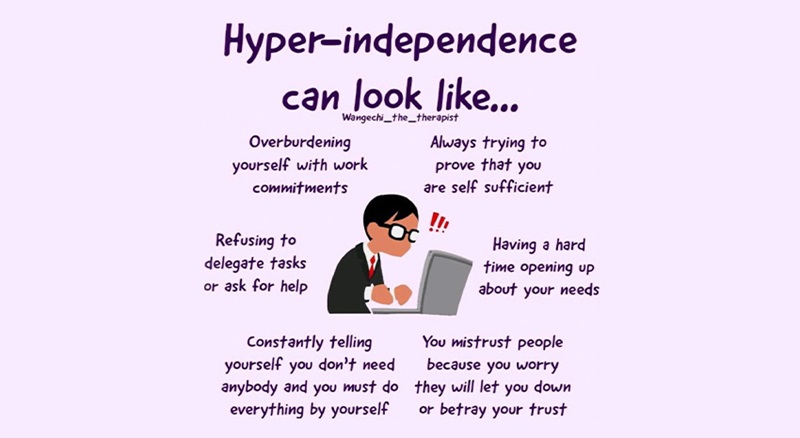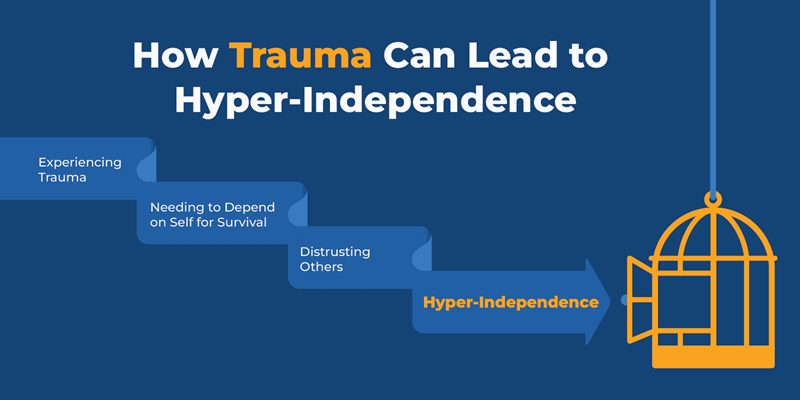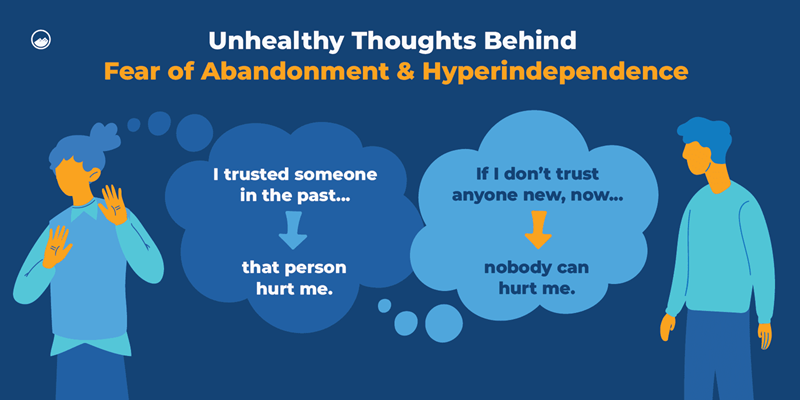Hyper-independence is a psychological state where one insists on taking care of everything by themselves, refusing help or support from others. While it may seem beneficial on the surface, it is often a response to past trauma that has caused an individual to develop a deep-seated fear of vulnerability.
Such individuals believe that by becoming entirely self-reliant, they can avoid getting hurt or disappointed by others. The traumatic experiences may have varied origins, such as childhood neglect, abuse, or abandonment, which can instigate a profound sense of insecurity and mistrust towards others. This leads to a reaction where the person determines to fend for themselves in all aspects of life, ultimately resulting in a state of hyper-independence.
This self-imposed isolation can also be a manifestation of Post-Traumatic Stress Disorder (PTSD). It’s important to note that, while self-reliance is generally seen as a positive trait, when it reaches a level of hyper-independence, it can lead to negative consequences such as loneliness, difficulty in forming and maintaining relationships, and even physical health problems due to stress and lack of support. It is essential for individuals experiencing hyper-independence as a trauma response to seek professional help in order to address the root causes of their behavior and learn healthier coping mechanisms.
Understanding Hyper-Independence: Definition and Symptoms
Hyper-independence refers to an extreme state of self-reliance where an individual strongly resists the assistance or influence of others. This is often a coping mechanism developed due to past trauma, fear of vulnerability, or a deep-seated belief in self-sufficiency.
It’s vital to distinguish between healthy independence and hyper-independence. The latter is not about demonstrating personal strength or capability; rather, it is an extreme and rigid stance that can lead to isolation, emotional disconnection, and potential burnout.
Symptoms of hyper-independence can manifest in various ways. Individuals showing signs of hyper-independence may exhibit an intense need for control in all aspects of their life, including relationships, work, and personal endeavors. They may consistently refuse assistance, even when it’s offered earnestly and would be beneficial. Hyper-independent individuals often have difficulty accepting or expressing emotions, viewing such vulnerability as a weakness. They also tend to struggle with trust issues, making it hard for them to build deep, meaningful relationships.
Hyper-independent individuals often place an excessive focus on self-reliance, even in situations where collaboration or support would yield better results. They may also exhibit a constant drive for perfection and an unwavering commitment to personal achievement, often at the expense of their own wellbeing. Such individuals may also have a tendency to overwork, frequently pushing themselves beyond their limits, which could lead to both physical and mental health issues.
Understanding hyper-independence requires recognizing these symptoms and the underlying psychological factors. It’s important to remember that while society often praises self-reliance, the extreme form of hyper-independence can lead to significant personal and interpersonal challenges. It’s crucial to strike a balance between maintaining personal autonomy and allowing for meaningful connections and support from others.

The Link Between Trauma and Hyper-Independence
The connection between trauma and hyper-independence is a fascinating and complex psychological topic. Trauma, particularly experienced in early life or childhood, can significantly shape an individual’s behavior and coping mechanisms in adulthood. One of these coping strategies often manifests as hyper-independence, a state where individuals are excessively self-reliant, often to the point of refusing help from others.
This is a form of self-protection, a way to exert control over their environment and protect themselves from potential harm or disappointment. They might fear that relying on others exposes them to vulnerability, something they have learned from past traumatic experiences equates to potential pain. However, while this hyper-independence may serve as a survival mechanism, it can also be isolating and detrimental to forming healthy, intimate relationships.
It’s essential to understand that this excessive self-reliance isn’t a character flaw but rather a response to past trauma. Therapy and emotional support can be beneficial in helping individuals navigate through their trauma and develop healthier coping mechanisms. Recognizing the link between trauma and hyper-independence is a crucial step in breaking the cycle, fostering healing, and promoting healthier interpersonal relationships.
How Trauma Shapes the Need for Extreme Self-Reliance
Trauma, whether it’s physical, emotional, or psychological, can profoundly impact an individual’s sense of security and trust in their environment. This can often manifest in the development of extreme self-reliance, a coping mechanism born out of the need to regain control and safeguard oneself from further harm.
Trauma survivors may come to believe that relying on others equates to exposing themselves to vulnerability and potential danger. This mindset can create an intense desire to secure their own safety and well-being, without the perceived risks associated with depending on others.
This heightened sense of self-reliance is often fueled by a deep-seated fear of re-experiencing the trauma, leading the individual to meticulously avoid any situations that may be reminiscent of their traumatic experiences. This could include avoiding relationships, refusing assistance, or excessively planning and preparing for potential threats. It’s a survival instinct, a shield built to protect oneself from the unpredictability of life, a way to navigate the world without having to rely on anyone else.
However, this extreme self-reliance can also be isolating and exhausting, as it often requires constant vigilance and an enormous amount of energy to maintain. It can hinder the development of healthy, supportive relationships and prevent the individual from seeking professional help, further complicating the healing process. It is crucial to understand this coping mechanism in trauma survivors, as it can provide valuable insights into their behavior and help guide them towards healthier ways of dealing with their trauma.
In conclusion, trauma can significantly shape an individual’s need for extreme self-reliance. It is not a sign of stubbornness or pride, but rather a deeply ingrained survival strategy birthed from past pain. Recognizing this can help us empathize with trauma survivors, and better support them on their journey towards healing and recovery.

Recognizing the Impact of Hyper-Independence on Relationships
Hyper-independence is the state where an individual excessively strives for self-reliance and autonomy, often avoiding or limiting emotional connections with others. This state can significantly affect both personal and professional relationships.
On one hand, the hyper-independent person’s need for autonomy and self-reliance can be seen as a strength, reflecting resilience and self-confidence, but it can also lead to isolation and loneliness. In a relationship, whether it is a romantic, familial or a friendship, balance is crucial. If one person is excessively independent, it may create an emotional divide, as the hyper-independent person may struggle to express vulnerability or seek support from their partner or friend, thereby hindering intimacy and trust.
In a professional setting, hyper-independence can compromise teamwork and collaboration, as the individual may resist delegating tasks or seeking input from others, which can lead to inefficiencies and strained relations. Hyper-independence can also result in the person neglecting their own emotional needs, as they may prioritize self-reliance over emotional connections, which can lead to feelings of emptiness or dissatisfaction. Recognizing the impact of hyper-independence on relationships is crucial for fostering healthier, more balanced dynamics.

Strategies for Addressing and Healing from Hyper-Independence
Hyper-independence, the extreme reliance on oneself to the exclusion of others, can lead to feelings of isolation, burnout, and emotional exhaustion. Addressing this issue requires a balanced approach that involves self-awareness, validation of feelings, setting boundaries, and seeking professional help if needed. The first step is to recognize and acknowledge the existence of hyper-independence. This recognition may come from noticing patterns of behavior, such as the refusal of help even when needed or the constant feeling of needing to prove oneself.
Validation of one’s feelings is also a critical step. Hyper-independent individuals often suppress their emotions, viewing them as weaknesses. It is essential to understand that it’s normal to have feelings of vulnerability and that expressing them does not make one less independent or capable.
Creating a healthy boundary between self-reliance and accepting help from others is another effective strategy. It involves understanding that asking for assistance does not equate to incompetence or lack of independence. It’s merely a recognition that everyone needs help at some point, and it’s okay to seek it when required.
Finally, seeking professional help can be beneficial. Psychotherapy, in particular, can provide tools to manage the feelings of fear and vulnerability that often accompany hyper-independence. Therapists can also facilitate the development of healthier interpersonal relationships and foster a more balanced view of independence. They can guide individuals in understanding that independence is not about doing everything alone but about having the freedom and ability to make choices, including the choice to seek help when needed.
In conclusion, addressing hyper-independence involves recognizing the issue, validating feelings, setting healthy boundaries, and potentially seeking professional help. This balanced approach can lead to healthier relationships with others and oneself, reducing feelings of isolation and emotional exhaustion associated with hyper-independence.
